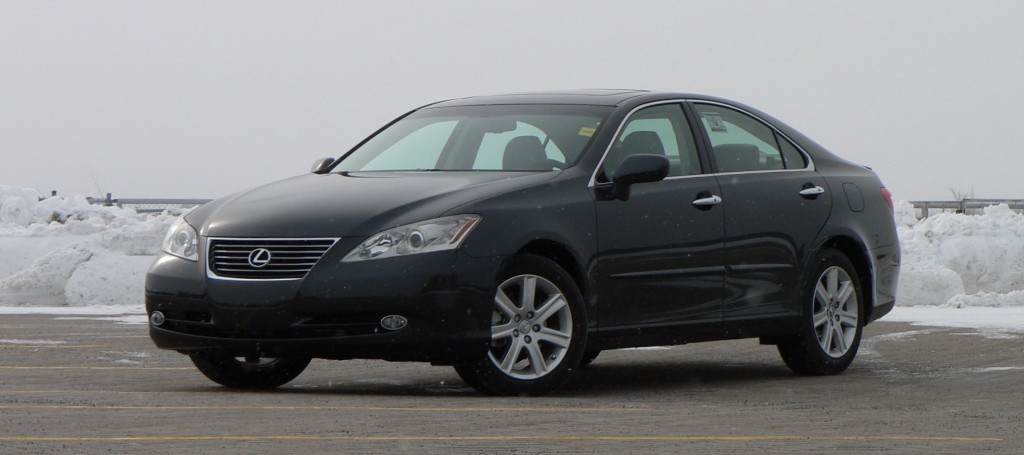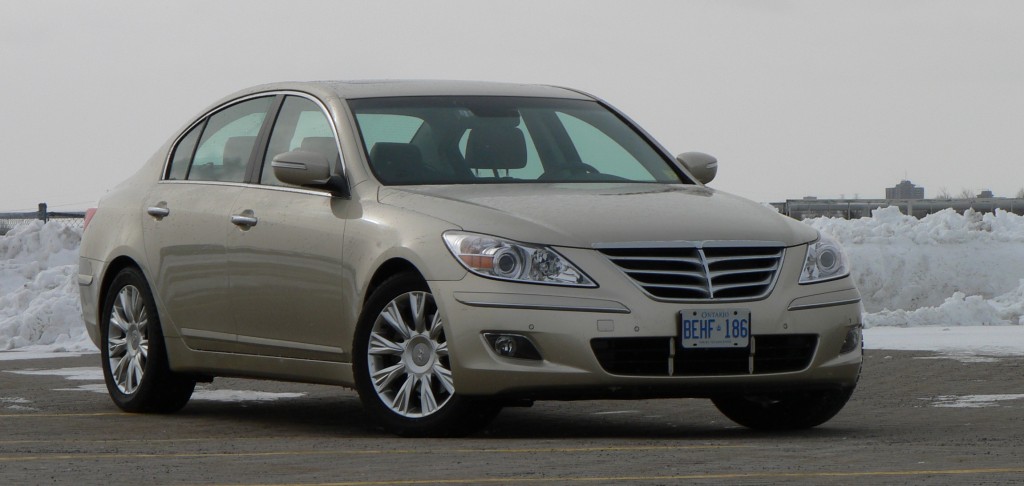Comparo: 2009 Hyundai Genesis 3.8 vs. Lexus ES 350
The Genesis can be had with a V8. But we think the 3.8 V6 model is an even better value. In the marketplace, the Genesis 3.8 goes toe-to-toe with the likes of the Acura TL and Nissan Maxima. Yet Hyundai officials readily admit it was the gold standard of the entry-level luxury sedan class — the long established Lexus ES 350 — that was the Korean automaker’s design bogey.
Let’s be clear: the front-wheel drive ES 350 is NOT a sports sedan. Lexus has its sportier rear-drive IS for those who want to go Bimmer hunting. As such, the ES 350’s focus has always been about coddling its customers with such qualities as low noise, vibration, harshness, ride comfort and outstanding build quality
Equally equipped. Not so equally priced.
With a base sticker of $39,950, the Lexus doesn’t appear to be much of a stretch in price compared to our Genesis 3.8 tester that starts at $37,995. However, when you check off all the options on both of these five-passenger sedans, the gap widens considerably.
To match the fully-loaded Genesis 3.8, one needs to pop for the ES 350’s Ultra Package. By doing so adds among other niceties: 14-speaker Mark Levinson audio upgrade; clearance and back up sensor; power rear window sunshade; navigation system with backup camera; power variable driver seat cushion; plus heated and cooled front seats. Unfortunately, that brings the final Lexus tally to $6,455 above what Hyundai wants for its similarly well-equipped luxury sedan.
One way to justify the extra dough Lexus wants is the wonderful build quality of the ES 350’s cabin. If more restrained in its execution than the gaudier Genesis, the Hyundai can’t match the laser-tight seams and refined finishes that Lexus is famous for
Being a smaller car overall, the ES 350 weighs about 200 kg less, as well. But that advantage only helps the Lexus slightly when it comes to fuel economy: both are rated 7.2 L/100 km on the highway, while the Lexus scores 10.9 L/100 km in the city, versus the thirstier Genesis at 11.4.
At any speed, the ES 350 is noticeably quieter than the Genesis. Engine noise in the Lexus is nearly silent and there’s virtually no road noise. The ES 350 will still understeer like a stuck pig when pushed hard. But a bit of a surprise was the Lexus’s ride control. Even over small whoop-dee-doos at high speeds, it’s much more composed then the looser feeling Genesis.
However, based on more tangible luxury sedan values — features-for-the-dollar, room to stretch out, and performance — we think there’s a better choice…
Buy this car if … you want a badge to impress the neighbours; a sensory deprivation chamber on wheels; the royal treatment at the dealer.
Don’t buy this car if … you need a roomier cabin; the most luxury sedan for your money.
First place: 2009 Hyundai Genesis 3.8 V6
One could argue that the rear-drive Hyundai is better suited to go up against the Lexus GS 350. But from a pricing standpoint, we would only be comparing apples to caviar.
Something for nothing — almost.
If one is really into saving money, the base model $37,995 Genesis 3.8 is certainly no stripper. Standard kit includes wood grain trim, power everything, heated and cooled leather-trimmed seats, dual zone climate control, and audio system with a six-disc CD player, plus iPod and auxiliary jacks and three months of free satellite radio. If you can make the payments, our $44,995 loaded tester with the $2,000 Premium and $5,000 Technology packages matches the loaded Lexus on spec, but beats it easily on price.
Keep in mind, one could add a 375-hp V8 under the hood of the Genesis and still walk away with $2,455 extra cash in your pocket compared to a loaded V6 ES 350.
In addition to room for passengers, the Hyundai also betters the Lexus for cargo space with a 450 L trunk versus 416 L. However, there is a caveat. The rear seats in the Genesis don’t fold down. Instead, you’ll have to make due with a pass-through that’s better suited for skis or hockey sticks.
Luxury first, sporty drive second.
While the Genesis 3.8 outperforms the ES 350, choosing the V6 instead of the available V8 doesn’t dramatically hamper the driving experience. Six- and eight-cylinder versions route power through six-speed automatic transmissions. And if not as silken as the Lexus mill, the Hyundai six is still plenty strong, quiet and smooth.
Value is in the eye of the beholder.
Hyundai has forsaken a badge on the Genesis’s front grille. In other words, brand snobs need not apply. Plus, unlike the separation Lexus customers get from the riff raff in Toyota showrooms, Hyundai decided against creating a standalone sales and service experience for the Genesis, something critics think doomed Volkswagen when it tried to sell its six-figure Phaeton luxury sedan.
But if none of that matters to you, and you’re looking for a well-built, well-equipped luxury sedan to ride out this economic downturn without giving up any of the luxury features you might be accustomed to, it’s hard to beat the 2009 Hyundai Genesis 3.8. More than being Car of the Year, consider it a Lexus for a Hyundai price.
Buy this car if … you want the most luxury features for the least amount of coin.
Don’t buy this car if … you are a brand snob; don’t want to share a showroom with Accent owners.







![[del.icio.us]](https://www.straight-six.com/wp-content/plugins/bookmarkify/delicious.png)
![[Digg]](https://www.straight-six.com/wp-content/plugins/bookmarkify/digg.png)
![[Facebook]](https://www.straight-six.com/wp-content/plugins/bookmarkify/facebook.png)
![[Google]](https://www.straight-six.com/wp-content/plugins/bookmarkify/google.png)
![[Reddit]](https://www.straight-six.com/wp-content/plugins/bookmarkify/reddit.png)
![[StumbleUpon]](https://www.straight-six.com/wp-content/plugins/bookmarkify/stumbleupon.png)
![[Twitter]](https://www.straight-six.com/wp-content/plugins/bookmarkify/twitter.png)
![[Email]](https://www.straight-six.com/wp-content/plugins/bookmarkify/email.png)